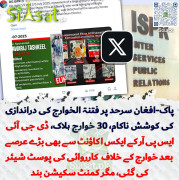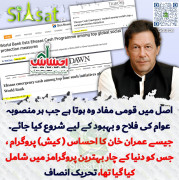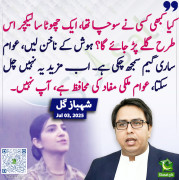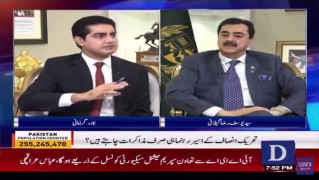Part XIV. The Fifth Proof That the Sunna is Probative: It is Unfeasible to Act Solely On the Basis of the Qur'an
It is impossible for any human being upon whom divine revelation did not descend with Allah's support, to understand the Shari`a, its details, and its rulings autonomously, from the Qur'an alone. It is therefore inevitable that one must look into the Sunna which was revealed together with the Qur'an and the Sunna which the Prophet -- Allah bless and greet him -- inferred from striving to understand the Qur'an, in which inferring he received divine confirmation.
One must therefore avail oneself of the Sunna in order to understand Allah Almighty's meaning and infer the details of rulings from the Qur'an, because the Sunna is the only path to achieve that objective. If the Sunna were not probative then this would not be the case. Nor would it be correct for any of those who exert scholarly striving to look into the Sunna and avail himself of it toward that end. As a result no-one would have understood what exactly they are held responsible for, the rulings would have been disregarded, the legal liabilities (al-takalif) would have been cancelled and in vain, all of which is absurd and impossible on the part of Allah Almighty and Exalted.
What makes it clear that it is impossible for a mujtahid to rely solely on the Qur'an to extract what we mentioned, is that because the Qur'an has reached such a level of miraculous inimitability (i`jaz) and the farthest limit of eloquence and economy, it contains many secondary meanings, treasure troves and secrets, many of which are known only to Him Whose Speech this is, and to him upon whom their exposition was descended and revealed -- Allah bless and greet him --.
Al-Bukhari narrated in this respect that when the Prophet -- Allah bless and greet him -- was asked about the status of donkeys (i.e. in comparison with horses in merit, especially in jihad), he replied: "Nothing was revealed to me concerning them except this all-encompassing, peerless verse: {And whoso does good an atom's weight will see it then, and whoso does ill an atom's weight will see it then** (99:7-8)."1 Consider how the Prophet -- Allah bless and greet him -- took the ruling concerning donkeys from that verse, and is anyone else able to do this?2
Furthermore, the Qur'an contains stipulations that are summarized (mujmala) and others that are complex (mushkila). It is therefore necessary, in order to put them into practice, to have an explanation that expounds, clarifies, interprets, and explains them. It is further necessary that such an exposition come from Allah Almighty and Exalted because it is He that has thrust responsibility upon His servants and therefore He knows what is being meant before anyone else. And this explanation is the Sunna that revelation brought or upon which Allah Almighty and Exalted confirmed His Prophet -- Allah bless and greet him -- if it originated in elucidatory striving on his part. Hence Allah Almighty and Exalted said {And We have revealed unto you the Remembrance that you may explain to mankind that which has been revealed for them** (16:44).
Following are some examples for the unfeasibility of acting solely on the basis of the Qur'an.
- Allah Almighty and Exalted said: {Establish prayer (salat) and pay the poor-due (zakat)** (2:43, 2:83, 2:110, 4:77, 24:56, 73:20). From this it is understood that both prayer and the poor-due are obligatory. However: what is the exact description of this obligatory prayer? What is its modality? What is its timing? What is its quantity and number? Upon whom is it obligatory? How many times is it obligatory in one's lifetime? And what is the exact description of this poor-due? Upon whom is it obligatory? Concerning what kind of property is it obligatory? What is its amount? And what is the condition of its obligatoriness?
- Allah Almighty and Exalted also said: {So (give) glory to Allah when you enter the night and when you enter the morning** (30:17). We understand from this the obligatoriness of giving glory and its time in general terms. However: what is meant by such glorification? Is it the same as prayer in His saying {Establish prayer**? Or is it something else, such as saying: subhan Allah?
- Allah Almighty and Exalted also said: {Recite, then, of the Quran that which is easy for you** (73:20). We understand from this the obligatoriness of reciting whatever is easy for us of the Qur'an. However: what is meant by such recitation? Is it the same as prayer? Or is it mere recitation of the Qur'an? If it means prayer, is one rak`a sufficient? And if one rak`a is sufficient, what are the actions which such a rak`a consists in?
- Allah Almighty and Exalted also said: {O you who believe! Bow down and prostrate yourselves** (22:77). We understand from this the obligatoriness of bowing down and prostrating. However, what is their exact modality and what is precisely meant by such bowing and prostrating? Are they the same as prayer or something else? If what is meant by them is prayer, then is the number of bows and the number of prostrations in it equal? Or is one superior to the other?
- Allah Almighty and Exalted also said: {Lo! Allah and His angels make salat upon the Prophet. O you who believe! Make salat upon him and salute him with a worthy salutation** (33:56). Is what is meant by this salat the very same as the prayer which Allah Almighty and Exalted made obligatory upon us when He said {Establish prayer**? Or is it something different? And in what does it consist when it proceeds from Allah and His angels as opposed to when it proceeds from us?
- Allah Almighty and Exalted also said: {They who hoard up gold and silver and spend it not in the way of Allah, unto them give tidings (O Muhammad) of a painful doom** (9:34). We understand from this the prohibition of hoarding up gold and silver and not spending it. However: what is meant by "spending" here as opposed to hoarding up?3 Does it consist in spending the entire amount of one's property as the Companions understood it when the verse was revealed? Or does it mean spending part of one's property? And what is the precise amount of that part?
- Allah Almighty and Exalted also said: {Perform to completion the pilgrimage (al-hajj) and the visit (al-`umra) (to Mecca) for Allah** (2:196). We understand from this the obligatoriness of performing to completion hajj and `umra. However: what is meant by hajj and `umra? Does it consist in the totality of what the Arabs used to do in the Time of Ignorance or in something else and what would that be? And how many times are they obligatory in one's lifetime?
- Allah Almighty and Exalted also said: {Those who believe and obscure not their belief by wrong-doing, theirs is safety and they are rightly-guided** (6:82). What is meant here by the wrong-doing the preclusion of which Allah made a precondition for the obtainment of safety and right guidance? Does it mean the totality of the various types of wrong-doing as the Companions understood it, or only a specific type, and what would the latter be?4
- Allah Almighty and Exalted also said: {As for the thief, both male and female, cut off their hands/arms. It is the reward of their own deeds, an exemplary punishment from Allah. Allah is Mighty, Wise**5:38). We understand by this the obligation of severing the hand/arm (yad) of each of them. However: what is the nature of the theft that makes such cutting off obligatory? Is it what is meant lexically by theft under in all its varieties or something else? And if the latter, then what exactly? And what are its conditions? What is the rate of the amount of property the stealing of which makes cutting off the hand or arm obligatory? And what is the modality of this cutting off? Is the limb cut off from the shoulder-joint? From the wrist? From the elbow? Is the cutting off repeated upon recidivism?
There are many such examples in the Glorious Qur'an. Try to empty your mind from all that the Sunna explicitly provided in the way of explanation pertaining to the above verses as well as what the jurists mentioned on the basis of the Sunna through analogy (qiyas) and other methods of elucidating the Sunna. Then see if anyone is able to answer to a single question among those we have mentioned above, and other questions of the same type. And supposing one is able to answer to some of the questions about these necessary issues, can he answer them all? And if no-one can do that, can we then fulfill those responsibilities thrust upon us? And is it rationally conceivable that Allah Sublime and Exalted should task us with responsibilities which He has concealed from us, and made us blind as to what He meant by them? Would it not be the height of absurdity and nonsense to claim that such as this issued from Allah Almighty?
All of the above shows that Allah Almighty and Exalted did not task us with these responsibilities which He listed in broad terms in His Book - in the full knowledge that our minds fall short of understanding His meaning - except that He first put in place an elucidator and patent explainer in charge of clarifying all these matters. This is Allah's Messenger -- Allah bless and greet him --. And He did this by means of His revelation and His support.
The following excerpt from Ibn Hazm on the principles of the Law illustrates what we just said:
Where in the Qur'an does it state that:
- Zuhr prayer is four rak`as?
- Maghrib is three rak`as?
- Ruku` is done in such-and-such a way?
- Sujud is done in such-and-such a way?
- Qur'anic recitation in the prayer is done in such-and-such a way?
- Salam is given at the conclusion of prayer, in such-and-such a way?
- What one must avoid when fasting?
- The modality of zakat for gold and silver, sheep, camels, and cattle?
- The determination of the zakatable capitals and amount of their zakat?
- The rituals of hajj from the time one stands in `Arafa?
- The modality of prayer at `Arafa and Muzdalifa?
- The modality of stoning at the three jimar in Mina?
- The description of the pilgrim's sacralized state (ihram)?
- What must be avoided in ihram?
- The amputation of the thief's limb?
- The definition of the breast-feeding that creates non-marriageable kinship?5
- What prepared foods are prohibited to eat?
- The description and definition of butchering and sacrificial slaughters?
- The modalities of penal rulings (ahkam al-hudud)?
- The description of the enactment of divorce?
- The rulings that pertain to selling?
- The exposition of usurious transactions (al-riba)?
- The modalities of juristic verdicts and appeals?
- Those of solemn oaths, water-dams (al-ahbas), life tenancy resulting in ownership of the tenant's heirs (al-`umra), collection of legal alms (al-sadaqat), and all the other topics of the Law?
We find in the Qur'an only comprehensive clauses (jumal). If we were left with them, we would not know how to apply them. In all this, the reference is none other than what is transmitted from the Prophet -- Allah bless and greet him --. It is the same with scholarly Consensus (al-ijma`) for the latter formed over but a few matters which we all gathered in a single book.6 ... Therefore, it is indispensable to refer back to the hadith. And if someone were to say: "We do not take except what we find in the Qur'an," that person would be an apostate by consensus of the Community, and would not thereby be obligated to pray more than one rak`a between the going down of the sun and the dark of night, and another one at dawn [cf. 17:78]. For this is the least that has been called salat, and there is no limit (hadd) set for the most in that chapter. One who follows such a position is an idolatrous disbeliever (kafir mushrik) whose life and property are licit. The only ones to go that path are some of the extremist Rafidis upon whose apostasy consensus has formed in the Community. And success is from Allah Almighty and Exalted. Now, should someone follow only what the entire Community has agreed upon and nothing else, leaving all that they differed about with regard to what the texts mention: such a person is a transgressor (fasiq) by consensus of the Community. These two preliminaries make it obligatory to accept what is transmitted.7
We have already cited several hadiths in illustration of the principles in this chapter.8 Below we also quote some of the countless Companion-reports and reports of the Salaf to that effect.
- Abu Bakr - Allah be well-pleased with him - said: "What earth could carry me, what heaven could shade me if I spoke about a single verse of Allah's Book according to my mere opinion or to say something of which I have no knowledge?"9
- `Umar - Allah be well-pleased with him - said: "I only fear for you two matters: A man that interprets the Qur'an in a way other than the interpretation in which it is meant, and a man who vies with his brother in acquiring property."10
- He also said: "I do not fear for this Community a believer whose faith holds him in check nor a dissolute man whose corruption is evident. However, I fear for it a man who read the Qur'an until he slickened his tongue with it, then he misconstrues it."11
- He also said: "Beware of those who put forward opinions (ashab al-ra'i) for they are the enemies of the Sunna. They have despaired of memorizing the Prophet's -- Allah bless and greet him -- narrations and have resorted to forwarding opinions. As a result they went astray and misguided others."12
- He also said: "Certain people shall appear who will dispute with you concerning the Qur'an: reply to them with the Sunan. For the possessors of the Sunan are the most knowledgeable about Allah's Book."13 `Ali - Allah be well-pleased with him - said the same thing to Ibn `Abbas - Allah be well-pleased with him - when he sent him to debate the Khawarij: "Do not argue with them by means of the Qur'an for it bears many interpretations (innahu dhu wujuh), but argue with them by means of the Sunna."14 Another version states that Ibn `Abbas said: "O Commander of the believers, I know the Qur'an better than them for it is in our homes that it was revealed," whereupon `Ali replied: "You said the truth, but the Qur'an is comprehensive in its phrasing (jammal) and bears many interpretations. You will say [it means one thing] and they will say [it means another]. Rather, argue with them by means of the Sunan, for they will not be able to find an escape from them."15
- Ibn Mas`ud - Allah be well-pleased with him - said: "You must hold fast to knowledge [= Sunna] before it is taken away. This taking away consists in the departure of those who possess it. None of you knows when he shall sorely need one of them, or needs what he has. Verily you shall encounter a people who claim that they are calling you unto Allah's Book when in fact they have tossed it behind their backs. So hold fast to knowledge, beware of innovating (al-tabaddu`), beware of excessive contention (al-tanattu`), and beware of deep involvement (al-ta`ammuq). Hold fast to the ancient (al-`atiq)."16
- Mu`awiya - Allah be well-pleased with him - said: "Truly the most seductive misguidance (aghra al-dalala) is for a man to read the Qur'an without understanding it, then he teaches it to boys, slaves, women, and slave-girls who then take to arguing with the people of knowledge over it."17
- `Imran ibn Husayn - Allah be well-pleased with him - said: "The Qur'an was revealed and Allah's Messenger instituted the Sunan." Then he said: "Follow us [Companions] or, by Allah! if you do not, you shall go astray."18
- While `Imran ibn Husayn was relating hadiths from the Prophet -- Allah bless and greet him --, a man said to him: "O Abu Nujayd! Talk to us from the Qur'an." Whereupon `Imran said to him: "You and your friends all read the Qur'an, so can you tell me about the salat, what it contains specifically and what its features are? Can you tell me in what consists the zakat for gold? camels? cows? the different types of goods? No. But I witnessed it, and you were not there." Then he said: "Allah's Messenger -- Allah bless and greet him -- imposed upon us such-and-such in the zakat etc." The man said: "You have given me new life, may Allah Almighty and Exalted give you new life also!" Al-Hasan said: "This man did not die before he had become one of the authoritative jurists of the Muslims."19
- Another version states: The people were rehearsing the narrations of hadith whereupon a man stood and said: "Enough of that, bring us something from Allah's Book!" `Imran ibn Husayn became angry and said: "You are an idiot! Allah Almighty and Exalted mentioned zakat in His Book; where then, is it mentioned that it consists in 5 parts out of every two hundred? Allah Almighty and Exalted mentioned salat in His Book; where then is it mentioned that zuhr consists in four rak`as?" Then he mentioned all the other prayers. He continued: "Allah mentioned circumambulation in His Book; where then did He say that tawaf consists in seven circumambulations? And where did He say that coursing between Safa and Marwa is sevenfold? We rule according to what is there [i.e. in the Qur'an], but the Sunna explains it."20
- A third version states: A man questioned the Companion `Imran ibn Husayn. When the latter answered him, the man said: "Talk to us from Allah's Book and do not talk to us from other than it." `Imran said: "You are an idiot! Can you find it in Allah's Book that zuhr is four rak`as in which one does not recite loud?" He went on to enumerate prayer, zakat, and other than that, then said: "Do you find all these explained in Allah's Book? Rather, Allah's Book has ruled all this, and the Sunna explains it."21
- Similarly one of `Imran's students, Mutarrif ibn `Abd Allah ibn al-Shikhkhir replied: "By Allah! We certainly do not seek a substitute for the Qur'an, but only him who is more knowledgeable of the Qur'an than we."22 Meaning: Allah's Messenger -- Allah bless and greet him --.
- A man asked `Abd Allah ibn `Umar - Allah be well-pleased with him -: "O Abu `Abd al-Rahman, we find the prayer of fear (salat al-khawf) and the prayer of residence (salat al-hadar) in the Qur'an, but we do not find the prayer of travel (salat al-safar)." Ibn `Umar replied: "Dear cousin: Allah Almighty and Exalted sent forth Muhammad -- Allah bless and greet him -- and we knew nothing. So we only do whatever we saw him do."23
- Similarly Jabir ibn `Abd Allah - Allah be well-pleased with him - said: "Allah's Messenger -- Allah bless and greet him -- was among us while the Qur'an was being revealed to him and he knew its explanation. Whatever he put into practice, we put into practice."24
- `Abd Allah ibn `Umar met Jabir ibn Zayd in tawaf and told him: "O Abu al-Sha`tha', you are one of the fuqaha' of Basra: therefore do not give any response except with the speaking Qur'an (biqur'anin natiqin) or a Sunna that has precedent (sunnatin madiya). If you do otherwise, you have perished and caused others to perish."25
- Hudhayfa ibn al-Yaman - Allah be well-pleased with him - said: "Only three types of persons give fatwas to people: A man who is either an Imam or a governor, and a man who can tell the abrogating verses of the Qur'an from the abrogated." They asked: "Who is such a man?" He said: "`Umar ibn al-Khattab. Other than those three types, there are only overreaching fools."26
- Imam al-Shafi`i said: "Most of what is abrogated in Allah's Book is known only through the indications of the Sunan of Allah's Messenger -- Allah bless and greet him --."27
- Another Tabi`i, Sa`id ibn Jubayr, was narrating a hadith of the Prophet -- Allah bless and greet him -- whereupon a man said: "There is something opposite to this in Allah's Book." Sa`id replied: "Do not, when I narrate to you from Allah's Messenger -- Allah bless and greet him --, claim a contradiction with Allah's Book. For Allah's Messenger -- Allah bless and greet him -- was more knowledgeable of Allah's Book than you."28
- Another Tabi`i, Hassan ibn `Atiyya, said: "Revelation would descend upon Allah's Messenger -- Allah bless and greet him -- and Gibril - peace upon him - would also tell him the Sunna that expounded it."29
- Another Tabi`i, Maymun ibn Mahran, said: "Truly this Qur'an has been torn to tatters (akhlaqa) in many breasts. Therefore, learn the hadiths that are beside it. Truly there are some who seek this knowledge as a commodity for worldly gain, while others learn it for self-display, and others to be pointed at. But the best of them are those who learn it in order to obey Allah by means of it."30 Ibn `Abd al-Barr said: "By the words `this Qur'an has been torn to tatters' he means - and Allah knows best - that its interpretation has been torn to tatters except that by means of the narrations of the practicing Salaf. So its interpretation is limited to whatever sound hadiths are narrated from them and excludes what people come up with in their minds or dispute about in their opinions, in the fashion of those who follow their lusts."31
- The Tabi`i Abu Wa'il Shaqiq ibn Salama said: "Do not sit with those who say: `But what if' (ara'ayt)." Similarly the Tabi`i al-Sha`bi said: "There is no expression more hateful to me than `But what if'" and "Those that came before you perished because of `But what if'."32
- The Tabi`i Ayyub al-Sikhtyani said: "If you tell someone of a Sunna and he then says: `Never mind this, tell us from the Qur'an': Know that that person is gone astray (dall)."33
- Al-Sha`bi said: "Those before you perished only when their paths multiplied and they diverged from the main road, leaving the transmitted reports (al-athar) behind. They went astray and misguided others."34
- `Abd Allah ibn al-Mubarak said: "Let your reliance be upon transmitted reports, and use, for personal opinion, only whatever the hadith expounds to you."35
- One of Hassan ibn `Atiyya's students, Imam al-Awza`i, similarly said: "The Book stands more in need of the Sunna than the Sunna stands in need of the Book."36 Ibn `Abd al-Barr explains: "He means that the Sunna presupposes the Book and expounds its purport, and this is the meaning of the saying of the scholars: `The Book has left a spot or the Sunna, and the Sunna has left a spot for [qualified] opinion.'"37
- Another Tabi`i, Yahya ibn Abi Kathir, said: "The Sunna adjudicates on (qadiya `ala) the Qur'an, but not the Qur'an on the Sunna." Ahmad ibn Hanbal said: "I do not go so far as to say that the Sunna adjudicates on the Qur'an, but the Sunna expounds the Book and explains it."38
- `Abd al-Rahman ibn Mahdi said: "A man stands more in need of the Sunna than he stands in need of food and drink."39
- Imam Ahmad further said: "The Sunna in our definition consists in the reports transmitted from Allah's Messenger -- Allah bless and greet him --, and the Sunna is the commentary (tafsir) of the Qur'an and contains its directives (dala'il)."40
Imam Ahmad further said: "Allah revealed His Book to His Prophet -- Allah bless and greet him -- and made the latter the indicator (al-dall) of both its outward meaning (zahiruhu) and its hidden meaning (batinuhu); its specific meaning (khassuhu) and its general meaning (`ammuhu); its abrogating verses (nasikhuhu) and its abrogated ones (mansukhuhu); and all that the Book purports. So Allah's Messenger -- Allah bless and greet him -- was the expounder (al-mu`abbir) of Allah's Book, indicating its meanings. His Companions witnessed him in this act, the very same men whom Allah Almighty and Exalted was content to choose as his Companions and elect for him. They transmitted all this from him. Therefore, they were, of all people, the most knowledgeable of Allah's Messenger -- Allah bless and greet him -- and of what Allah Almighty and Exalted meant by His Book, by witnessing him and watching firsthand that which the Book addressed. Therefore, they were the expounders of all this after Allah's Messenger -- Allah bless and greet him --. Thus did Jabir say: "Allah's Messenger -- Allah bless and greet him -- was among us while the Qur'an was being revealed to him and he knew its explanation. Whatever he put into practice, we put into practice."41
NOTES
1Narrated from Abu Hurayra by al-Bukhari, Muslim, al-Nasa'i, Ahmad, and Malik.
2The commentators said that this means that whatever end to which the donkeys are used for determines their legal status as instruments of good or evil. Ibn Hajar said in commentary upon this hadith: "It provides a firm affirmation for basing practice on the external senses of the general statement (al-`amal bizawahir al-`umum) and the binding nature of the latter until the proof of specificity (dalil al-takhsis) is pointed out. There is also in the hadith an indication of the difference between a specific ruling explicitly stipulated (al-hukm al-khass al-mansus) and a general ruling in external terms (al-`amm al-zahir), the latter being inferior to the former as an evidentiary proof."
3The Sunna reveals that is meant by the "spending" stipulated here is the zakat.
4The Sunna reveals that what is meant by "wrong-doing" here is shirk.
5The best detailed summation of this topic from the two perspectives of the legal rulings of the Four Schools and their evidences is Dr. Sa`d al-Mirsafi's Ahadith al-Rida` Hujjiyyatuha wa Fiqhuha ("The Hadiths of Breastfeeding: Their Probativeness and Jurisprudence") (Kuwait and Beirut: al-Manar and al-Rayyan, 1994).
6Maratib al-Ijma`, which Ibn Taymiyya critiqued in his Naqd Maratib al-Ijma`.
7Ibn Hazm, al-Ihkam fi Usul al-Ahkam (2:79-80).
8See earlier section of "The Probativeness of the Sunna."
9Narrated from Ibn Abi Mulayka and `A'isha by Ibn al-Qayyim in I`lam al-Muwaqqi`in (1:53-54, 1:82, 2:184) who declared it sound (sahih). Cf. Imam al-Shafi`i's similar remark: After al-Shafi'i narrated a hadith to a man who asked him about a certain matter the latter said: "Do you also say the same?" whereupon al-Shafi'i seemed jolted, his color changed, and he said: "Woe to you! What earth would carry me, what heaven would shade me if I narrated from Allah's Messenger -- Allah bless and greet him -- something but did not adhere to it? Yes, I adhere to it heart and soul! Yes, I adhere to it heart and soul!" Narrated by al-Hakim as cited by Ibn al-Qayyim in I'lam al-Muwaqqi'in (2:286).
10Narrated with a missing Tabi`i link from `Amr ibn Dinar by Ibn `Abd al-Barr in Jami` Bayan al-`Ilm (2:1202 #2364).
11Narrated from `Abd al-`Aziz ibn Abi Hazim by Ibn `Abd al-Barr in Jami` Bayan al-`Ilm (2:1204 #2368) with a weak chain as stated by al-Zuhayri.
12Narrated from `Amr ibn Hurayth by al-Daraqutni in his Sunan (4:146), al-Bayhaqi in al-Madkhal (p. 190), Ibn Hazm in al-Ihkam (6:213), and al-Lalika'i in Sharh Usul I`tiqad Ahl al-Sunna (1:123). See the definition of permissible ra'i by Ibn Hajar in Fath al-Bari (1959 ed. 13:189) and Ibn al-Qayyim in I`lam al-Muwaqqi`in (1:83) as well as al-Kawthari's Fiqh Ahl al-`Iraq and the introduction to al-Tahanawi's I`la' al-Sunan.
13Narrated by al-Darimi in his Sunan, al-Khatib in Tarikh Baghdad (14:286), and al-Lalika'i in Sharh Usul I`tiqad Ahl al-Sunna (1:123 [also from `Ali]).
14Narrated from `Ikrima by Ibn Sa`d according to al-Suyuti in al-Durr al-Manthur in his commentary on the verse (show us the straight path( (1:6).
15Ibid.
16Narrated with a mursal chain of sound narrators from Abu Qilaba - who did not meet Ibn Mas`ud as stated by al-Haythami in Majma` al-Zawa'id (1:126) - by al-Darimi, al-Azdi in his Jami` (11:252), Ibn Waddah in al-Bida` (#25), Muhammad ibn Nasr al-Marwazi in al-Sunna (p. 29-30), al-Lalika'i in Sharh Usul I`tiqad Ahl al-Sunna (1:87 #108), al-Tabarani in al-Kabir (9:170), and Ibn `Abd al-Barr in Jami` Bayan al-`Ilm (2:1202 #2363), the latter with a weak chain according to al-Zuhayri. Al-Darimi's chain is strengthened by al-Bayhaqi's uninterrupted chain to Ibn Mas`ud from the trustworthy Tabi`i `A'idh Allah ibn `Abd Allah in al-Madkhal (p. 272).
17Narrated by Ibn `Abd al-Barr in Jami` Bayan al-`Ilm (2:1203 #2365) with a chain containing an unknown narrator.
18Narrated by Ahmad with a weak chain because of `Ali ibn Zayd - although al-Tirmidhi considers him truthful (saduq).
19Narrated from al-Hasan al-Basri by Abu Dawud in his Sunan with a chain declared sound by Ibn Hajar in Lisan al-Mizan (1:3) and by al-Hakim (1:109-110) with a sound chain as confirmed by al-Dhahabi. Cf. al-Suyuti, Miftah al-Janna (p. 73 #131, p. 23-25 #23).
20Narrated by Abu Nadra by Ibn al-Mubarak in al-Zuhd (p. 23).
21Narrated from Abu Nadra by Ibn al-Mubarak in his Musnad (p. 143), al-Ajurri in al-Shari`a (p. 51), and Ibn `Abd al-Barr in Jami` Bayan al-`Ilm (2:1192 #2348), where it is declared authentic by al-Zuhayri.
22Narrated by Ibn `Abd al-Barr in Jami` Bayan al-`Ilm (2:1193 #2349) with a sound chain according to al-Zuhayri.
23A sound narration from Ibn Shihab by al-Nasa'i, Ibn Majah, Ahmad, and Malik.
24Narrated from Muhammad al-Baqir as part of a long hadith by Muslim, Abu Dawud, and Ahmad.
25Narrated from Jabir ibn Zayd by al-Darimi in his Sunan.
26Narrated from Muhammad ibn Sirin by al-Darimi in his Sunan with a chain of sound narrators.
27Al-Shafi`i, al-Risala (p. 222).
28Narrated from Ya`la ibn Hakim by al-Darimi with a chain of sound narrators.
29Narrated from al-Awza`i by al-Darimi, Abu Dawud in al-Marasil (p. 361 #18490), Muhammad ibn Nasr al-Marwazi in al-Sunna (p. 28), al-Lalika'i in Sharh Usul I`tiqad Ahl al-Sunna (1:83), and Ibn `Abd al-Barr in his Jami` (2:1193 #2350) and it is a sound narration according to Ibn Hajar in Fath al-Bari (13:291) and al-Zuhayri.
30Narrated by Abu Nu`aym in the Hilya (1985 ed. 4:84) and Ibn `Abd al-Barr in Jami` Bayan al-`Ilm (2:1203 #2366) with a fair chain according to al-Zuhayri.
31Ibn `Abd al-Barr, Jami` Bayan al-`Ilm (2:1203).
32Narrated respectively from al-Zabarqan al-Sarraj, Ibn Abi Khalid, and Dawud ibn Abi Hind by Ibn `Abd al-Barr in Jami` Bayan al-`Ilm (2:1076-1077 #2094, #2095, and #2097) with one fair chain and two sound ones according to al-Zuhayri.
33Narrated from Makhlad ibn al-Husayn by al-Hakim in Ma`rifa `Ulum al-Hadith (p. 65) and from al-Awza`i by al-Khatib in al-Kifaya (Madina ed. p. 15).
34Narrated from al-Hasan ibn Wasil by Ibn `Abd al-Barr in Jami` Bayan al-`Ilm (2:1050 #2026).
35Narrated from `Abdan ibn `Uthman by Ibn `Abd al-Barr in Jami` Bayan al-`Ilm (2:1050 #2023) with a sound chain according to al-Zuhayri.
36Narrated by Ibn `Abd al-Barr in his Jami` (2:1193 #2350) and it is sound according to al-Zuhayri. Ibn `Abd al-Barr also cites it (2:1194 #2352) as narrated by al-Awza`i from Makhul.
37Ibn `Abd al-Barr, Jami` Bayan al-`Ilm (2:1194).
38Narrated respectively from al-Awza`i and al-Fadl ibn Zyad by Ibn `Abd al-Barr in Jami` Bayan al-`Ilm (2:1194 #2353-2354).
39Narrated from `Ali ibn al-Madini by al-Khatib in Tarikh Baghdad (2:187) and al-Kifaya (Madina ed. p. 15).
40Narrated from `Abdous ibn Malik al-`Attar by al-Lalika'i in Sharh Usul (1:156).
41In Ibn al-Qayyim, I`lam al-Muwaqqi`in (1973 ed. 2:290-291). For Jabir's hadith see above, n. 24.
This is the end of the Series entitled "Probativeness of the Sunna" in 15 parts posted on the Internet from the months of Muharram to Jamadi al-Awwal 1420 corresponding to the months of May to August 1999. The text is based on Dr. 'Abd al-Ghani 'Abd al-Khaliq's Hujjiyya al-Sunna (Herndon, VA: Dar al-Wafa', 1993) p. 243-253 and 278-334, translated from Arabic and annotated by Dr. Gibril F. Haddad.
Allah's blessings and peace on the Prophet Muhammad, his Family, and his Companions as well as those who follow them to their utmost until the Day of Judgment, especially the Four Imams of Law, the pious scholars of knowledge, and the righteous Friends of Allah, most especially our Shaykhs in the most distinguished Naqhsbandi Way, Shah Naqshband, Shaykh `Abd al-Khaliq al-Ghujdawani, Mawlana Khalid al-Baghdadi, Sultan al-Awliya Shaykh `Abd Allah al-Daghistani, Mawlana Shaykh Nazim al-Haqqani, and those who follow their directives faithfully. And praise belongs to Allah first and last.
Was-salamun `ala al-mursaleen wal-hamdulillahi Rabbil `alameen




























